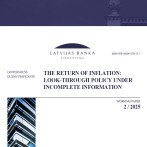Annual inflation continues to shrink despite growing energy resource prices
In January 2012 the annual inflation dropped to 3.6%, yet consumer prices rose 0.8% month-on-month.
As was already expected, the global prices pushed up month-on-month energy resource prices – gas (by 8.6%), thermal energy (9.4%) and fuel (4.0%). A balancing effect on the monthly inflation was, however, provided by the prices of wearing apparel and footwear, which dropped 6.4% as a result of January seasonal sales. Food price fluctuations in the global market have diminished year-on-year and, compared to 2011, the proportion of food in the basket of commodities has shrunk, lessening the impact of food prices on inflation. The prices of food and non-alcoholic beverages rose 1.1% month-on-month (2.1% in January 2011).
The annual inflation dropped in January as a result of the so-called base effect, (in Estonia, by contrast, the base effect is pushing the annual inflation up, for in January of this year the prices of goods and services related to housing have risen whereas they dropped in January 2011). The month-on-month rise in food and fuel prices in January 2011 in Latvia was more rapid than this year; indirect taxes also went up in 2011 while remaining unchanged this year. Other similar effects where the annual inflation drops because of the developments of the previous year or base effect will continue to appear within the year: e.g., in April the impact of the prices of electrical power on inflation will abate (in April 2011, the new tariffs, differentiated by consumption, went into effect), and in June and July the base period for the impact of excise tax and VAT on the prices of alcoholic beverages, tobacco, fuel and natural gas and thermal energy will end.
Albeit the possible scenarios of the development of oil prices are still very uncertain, the impact of demand on the changes in prices of oil products and other energy resources is expected to be less than in 2011, for the growth of the global economy has slowed down.
In the assessment of the World Bank, global food price levels might drop this year (even though the reports of draught in some places in South America have raised doubts about the harvest of some cultures, e.g., corn). This drop would be determine both by the slowdown of economic growth and the good previous season's harvests in other parts of the world (primarily in the Asian countries and Australia), which have allowed to increase stocks.
Every year, the Central Statistical Bureau updates the item weights of the consumption basket, and the so-called weight changes can have an impact on inflation, yet in 2012 this impact is rather expected to be neutral. Since in 2011 the average income of the population grew slightly and consumption habits changed a little, the proportion of the groups of goods and services did not experience changes symmetrical to their price changes. The proportion of expenditure for the purchases of transport vehicles and fuel, rent and home repairs as well as wearing apparel and footwear has grown and thus, if the price changes in these groups of commodities change, they can leave a greater impact on inflation than in the previous year. The proportion of food, gas, transport services and catering services in the basket of commodities has dropped slightly and because of weights the changes in the prices of these goods and services will have a lesser effect on inflation than in 2011.
Textual error
«… …»






